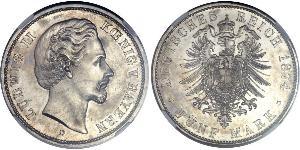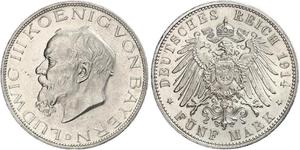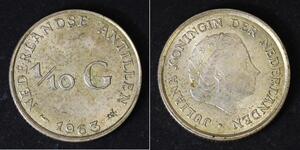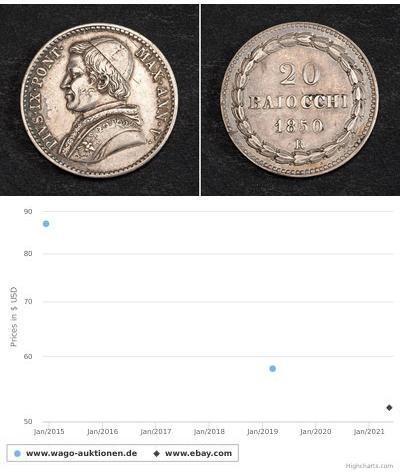3 Марка (продана за $46.0)
1911, Bavaria (Kingdom), Prince Luitpold. Silver 3 Mark "90th Birthday" Coin.
Mint Year: 1911
Reference: KM-517.
Mint Place: Munich (D)
Condition: Minor scratches, otherwise a nicely toned AU+
Denomination: 3 Mark - Struck for the 90th birthday of Prince-Regent Luitpold!
Weight: 16,66gm
Diameter: 33mm
Material: Silver
Obverse: Beareded head of Prince Regent Luitpold of Bavaria right. Anniversary dates below.
Legend: LVITPOLD PRINZ. REGENT V. BAYERN / D - 1821 . 12 MAERZ . 1911
Reverse: Crown of the German Empire above heraldic eagle of Germany with shield at chest and star order.
Legend: DEUTSCHES REICH 1911 * DREI MARK *
Luitpold, Prince Regent of Bavaria (German: Prinzregent Luitpold Karl Joseph Wilhelm Ludwig von Bayern) (12 March 1821–12 December 1912), was the regent and de facto ruler of Bavaria from 1886 to 1912, due to the incapacity of his nephews, Ludwig II and Otto.
Luitpold was born in Würzburg, the third son of King Ludwig I of Bavaria and of his wife Princess Therese of Saxe-Hildburghausen. He was the younger brother of King Maximilian II of Bavaria and of King Otto of Greece. In addition to being in line to the throne of Bavaria, Luitpold was also heir presumptive to the throne of Greece since his brother Otto had no children. However, the Greek law of succession required that Otto's heir convert to the Eastern Orthodox Church in order to become king; Otto was not willing to do this. Otto was deposed in 1862 and replaced by a Danish prince who became King George I of Greece. Otto died in 1867, leaving Luitpold and his descendants as representatives of Otto's claim; however, Luitpold never pursued this.
During the rule of his brother Maximilian II (1848–64) Luitpold did not play a significant political role. With the reign of his nephew Ludwig II (1864-1886) Prince Luitpold had increasingly to represent the royal house due to the king's long absence from the capital. In the Austro-Prussian War in 1866 Luitpold was commander of the 3rd Division. In 1869 he became Inspector General of the Bavarian army, during the Franco-Prussian War 1870/71 he represented Bavaria in the staff headquarters. As such he handed over on 3rd of December 1870 Ludwig's Kaiserbrief to the Prussian King William I offering the crown of the German Empire. In 1876 Luitpold was appointed field marshal.
On 10 June 1886, Luitpold's nephew King Ludwig II was declared mentally incompetent and Luitpold was named Regent. Luitpold's part is still controversial. Following Ludwig II's mysterious death a few days later, Luitpold continued to serve as regent for the new king, Otto, Ludwig's insane brother. Prince Luitpold was even accused by some people to be the murderer of his nephew, but soon the decent and affable prince became one of Bavaria's most popular rulers. One of his first actions (on 1 August 1886) was to open several of the palaces of Ludwig II to the public.
During the regency of Prince-Regent Luitpold relations between Bavarians and Prussians remained cold with Bavarians remembering the anti-Catholic agenda of Bismarck's Kulturkampf as well as Prussia's strategic dominance over the empire.
Luitpold continued to serve as regent until his death of bronchitis in 1912 in Munich, when he was succeeded by his eldest son, Ludwig. He is buried in the crypt of the Theatinerkirche in Munich.
Luitpold's years as regent were marked by tremendous artistic and cultural activity in Bavaria where they are known as the Prinzregentenjahre or the Prinzregentenzeit. Bavaria prospered under a liberal government and Munich became a cultural centre of Europe. Thomas Mann wrote about this period "Munich shone" (1902 Gladius Dei).
There are numerous streets in Bavarian cities and towns called Prin zregentenstrasse or Luitpoldstrasse. Many institutions are named in Luitpold's honour including the Prinzregententheater in Munich and the Luitpoldarena and the Luitpoldhalle in Nürnberg. In 1891 Luitpold established the Luitpold Gymnasium in Munich. Prinzregententorte is a multi-layered cake with chocolate butter cream named in his honour.
Luitpolds great passion next to the arts was hunting, his legendary hunts took place in the entire kingdom.
1625, Bavaria, Maximilian I. Silver Pfennig Coin. (F-VF) Munich mint! Mint Year: 1625 Condition: F-VF Reference: KM-5. Denomination: Pfennig Mint Place: Munich (Bavaria) Diameter: 13mm Weight: 0.32gm Material: Silver Obverse: Date (1625) above initial letter ("M") of the Duke. All within circle. Reverse: Shield with Bavarian arms. Authenticity unconditionally guaraneed. Maximilian I, Duke/Elector of Bavaria (17 April 1573 – 27 September 1651), called "the Great", was a Wittelsbach ruler of Bavaria and a prince-elector (Kurfürst) of the Holy Roman Empire. His reign was marked by the Thirty Years' War (1618–1648). He was born in Munich, the eldest son of William V, Duke of Bavaria and Renata of Lorraine to survive infancy. He was educated by the Jesuits, and upon his father's abdication, began to take part in the government in 1591. In 1595 he married his cousin, Elisabeth Renata (also known as Elizabeth of Lorraine), daughter of Charles III, Duke of Lorraine, and became Duke of Bavaria upon his father's abdication in 1597. His first marriage to Elisabeth Renata was childless. Only a few months after the death of Elisabeth Renata, Maximilian married, on 15 July 1635 in Vienna, his 25-year-old niece Maria Anna of Austria (1610-1665), the daughter of Ferdinand II, Holy Roman Emperor and Maximillian's sister, Maria Anna of Bavaria (1574-1616). The main motivation for this swift remarriage was not so much political grounds as the hope of producing a prince to inherit. In contrast to the Elector's first wife, Maria Anna was very interested in politics and well instructed about developments. She was not bound to the Habsburgs, but rather completely advocated the Bavarian standpoint. Additionally, she conducted lively exchanges of opinion with high officials of the Munich court and took part in meetings of the cabinet. By his second wife, Maria Anna of Austria (1610-1665), he left two sons, Ferdinand Maria, who succeeded him, and Maximilian Philip. As the ablest prince of his age he sought to prevent Germany from becoming the battleground of Europe, and although a rigid adherent of the Catholic faith, was not always subservient to the church. Weak in health and feeble in frame, Maximilian had high ambitions both for himself and his duchy, and was tenacious and resourceful in prosecuting his designs. Maximilian refrained from any interference in German politics until 1607, when he was entrusted with the duty of executing the imperial ban against the free city of Donauwörth, a Protestant stronghold. In December 1607 his troops occupied the city, and vigorous steps were taken to restore the supremacy of Catholicism. Some Protestant princes, alarmed at this action, formed the Protestant Union to defend their interests, which was answered in 1609 by the establishment of the Catholic League (German), in the formation of which Maximilian took an important part. Under his leadership an army was set on foot, but his policy was strictly defensive and he refused to allow the League to become a tool in the hands of the House of Habsburg. Dissensions among his colleagues led the duke to resign his office in 1616, but the approach of trouble brought about his return to the League about two years later. Having refused to become a candidate for the imperial throne in 1619, Maximilian was faced with the complications arising from the outbreak of war in Bohemia. After some delay he made a treaty with Ferdinand II, Holy Roman Emperor in October 1619, and in return for large concessions placed the forces of the League at the emperor's service. Anxious to curtail the area of the struggle, he made a treaty of neutrality with the Protestant Union, and occupied Upper Austria as security for the expenses of the campaign. On 8 November 1620 his troops under Johann Tserclaes, Count of Tilly defeated the forces of Frederick, King of Bohemia and Count Palatine of the Rhine, at the Battle of White Mountain near Prague. Subsequently Ferdinand II released Upper Austria as a pawn for Maximilian until 1628. In spite of the arrangement with the Union, Tilly then devastated the Rhenish Palatinate, and in February 1623 Maximilian was formally invested with the electoral dignity and the attendant office of imperial steward, which had been enjoyed since 1356 by the Counts Palatine of the Rhine. After receiving the Upper Palatinate and restoring Upper Austria to Ferdinand, Maximilian became leader of the party which sought to bring about Albrecht von Wallenstein's dismissal from the imperial service. At the Diet of Regensburg (1630) Ferdinand was compelled to assent to this demand, but the sequel was disastrous both for Bavaria and its ruler. Attempting to remain neutral during the war, Maximilian signed the secret Treaty of Fontainebleau (1631) with the Kingdom of France, but this proved worthless. Early in 1632 the Swedish Empire marched into the duchy and occupied Munich, and Maximilian could only obtain the assistance of the imperialists by placing himself under the orders of Wallenstein, now restored to the command of the emperor's forces. The ravages of the Swedes and their French allies induced the elector to enter into negotiations for peace with King Gustavus Adolphus of Sweden and Cardinal Armand Jean du Plessis, Cardinal Richelieu of France. He also proposed to disarm the Protestants by modifying the Edict of Restitution of 1629, but these efforts were abortive. In September 1638 Baron Franz von Mercy was made master-general of ordnance in the army of Bavaria, then the second largest army in the Holy Roman Empire. Mercy and Johann von Werth as lieutenant field-marshal fought with varying success France and Sweden. In March 1647 Maximilian concluded the Truce of Ulm (1647) with France and Sweden, but the entreaties of Ferdinand III, Holy Roman Emperor led him to disregard his undertaking. Bavaria was again ravaged, and the elector's forces were defeated in May 1648 at the Battle of Zusmarshausen. The Peace of Westphalia soon put an end to the struggle. By this treaty it was agreed that Maximilian should retain the electoral dignity, which was made hereditary in his family; and the Upper Palatinate was incorporated with Bavaria.

|
Добавив:
anonymous 2024-08-28 |
|
||
|
||
|
||
|
||
|
||
1/10 Гульден Нідерландські Антильські острови (1954 – 2010) ...
в групі 11 монет / 6 цін
⇑

-600-300-wcysHgTyTfoAAAGRHeR_gJnh.jpg)

-300-150-28gsHgTyJlcAAAGO0BkL5Mrr.jpg)
 Deutsch
Deutsch Русский
Русский Українська
Українська English
English Italiano
Italiano Français
Français Español
Español 汉语
汉语




-300-150-l_gsHgTydE8AAAGWyKdtX7tA.jpg)







